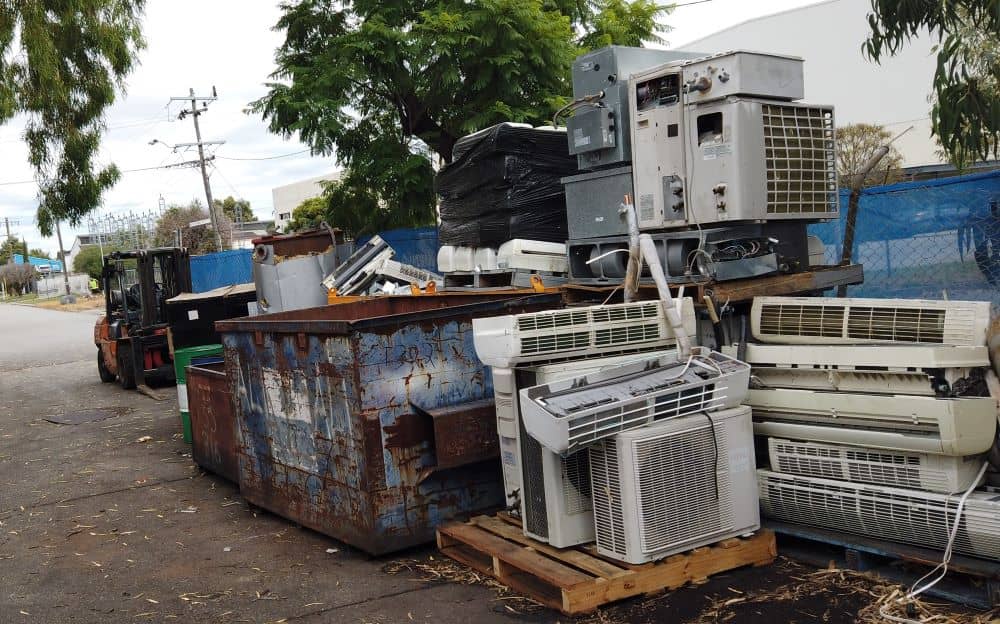As Sydney residents, we're no strangers to the importance of staying cool during the city's scorching summers. Air conditioners are a lifeline for comfort, but what happens when these trusty cooling companions reach the end of their life cycle? Many Sydneysiders are unaware that there's a responsible and eco-friendly way to dispose of scrap air conditioners, and it involves recycling.
In this article, we'll explore the eco-friendly approach to recycling scrap air conditioners in Sydney and why it's essential for both our environment and community.
Why Recycle Scrap Air Conditioners?
Before diving into the recycling process, it's crucial to understand why recycling scrap air conditioners is a preferable option over tossing them into landfills. Air conditioners, like any other electronic appliances, contain various components and materials, some of which can be hazardous to the environment if not handled properly.
- Refrigerants: Air conditioners typically contain refrigerants like hydrochlorofluorocarbons (HCFCs) or hydrofluorocarbons (HFCs). These substances are potent greenhouse gases and can contribute to ozone layer depletion if released into the atmosphere.
- Metals: Air conditioners contain valuable metals like copper and aluminum. Recycling these metals not only conserves natural resources but also reduces the energy required for new production.
- Electronic Waste: Electronic waste, or e-waste, is a growing environmental concern. Properly recycling air conditioners helps mitigate the impact of e-waste by diverting these items from landfills.
- Energy Efficiency: Recycling air conditioners supports energy efficiency efforts. Reusing components and materials can reduce the need for new manufacturing, which is often energy-intensive.
Recycling Process for Scrap Air Conditioners in Sydney
Recycling scrap air conditioners in Sydney involves a series of steps to ensure that various components are properly handled and disposed of or repurposed. Here's an overview of the recycling process:
- Collection and Transportation: The process starts with collecting old and non-functional air conditioners. Recycling centers or specialized facilities are equipped to handle these units. Transportation is carried out using eco-friendly methods to minimize emissions.
- Refrigerant Recovery: One of the most critical steps is the recovery of refrigerants. These gases are carefully extracted from the air conditioner's system to prevent their release into the atmosphere. Recovered refrigerants can be purified and reused or properly disposed of.
- Component Separation: Once at the recycling facility, the air conditioners are disassembled, and various components are separated. This includes removing metals like copper and aluminum, which can be sent for recycling. Plastic components are also separated for proper processing.
- Safe Disposal: Any hazardous materials, such as the compressor oil, are disposed of according to environmental regulations. Recycling facilities adhere to strict guidelines to ensure that these substances do not harm the environment.
- Material Recovery: Metals and other recyclable materials are sent to specialized recycling facilities. These materials are then processed and used in the manufacturing of new products, reducing the need for virgin resources.
- Responsible E-Waste Management: Electronic waste, including non-recyclable parts of air conditioners, is managed in an environmentally responsible way. This includes properly disposing of electronic components and preventing them from ending up in landfills.
Community Benefits of Scrap Air Conditioner Recycling
Recycling scrap air conditioners in Sydney not only benefits the environment but also has positive implications for the community:
- Reducing Landfill Waste: Diverting air conditioners from landfills reduces the strain on local waste management systems and helps prolong the lifespan of existing landfills.
- Creating Jobs: Recycling facilities and programs create employment opportunities within the recycling industry, contributing to the local economy.
- Supporting Sustainable Practices: Recycling air conditioners promotes sustainability and encourages individuals and businesses to adopt responsible waste disposal habits.
- Energy Conservation: Recycling metals and materials from air conditioners conserves energy by reducing the demand for new production.
How to Recycle Your Scrap Air Conditioner in Sydney
If you have an old or non-functional air conditioner that needs disposal in Sydney, consider these steps to recycle it responsibly:
- Contact a Recycling Center: Look for recycling centers or facilities in Sydney that accept scrap air conditioners. They can provide guidance on proper disposal.
- Consult with Professionals: Seek assistance from HVAC professionals or technicians who specialize in the safe removal and disposal of air conditioners.
- Check Local Programs: Some local governments or environmental organizations may offer recycling programs for electronic waste, including air conditioners. Check if any such programs are available in your area.
In conclusion, recycling scrap air conditioners in Sydney is a crucial step toward a more sustainable and eco-friendly future. By responsibly disposing of these units, we not only reduce the environmental impact of electronic waste but also contribute to the well-being of our community. It's time to embrace the eco-friendly approach and ensure that our beloved city remains cool, both in terms of temperature and environmental responsibility.
Top of Form


No comments yet